For coffee lovers who want to reduce their caffeine intake without sacrificing flavor, decaffeinated coffee pods offer a convenient solution. This review examines nine of the best decaffeinated Coffee Pods, comparing their taste, aroma, and overall quality to help you find the perfect cup of decaf coffee.
PureCoffeeCraft is a participant in the Amazon Services LLC Associate Program, an affiliate advertising program designed to provide a means for sites to earn advertising fees by advertising and linking to Amazon.com. There is no extra cost to consumers for clicking on the following links.

Eight O’Clock Decaf Original K-Cups
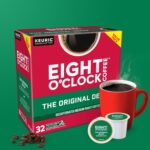
Eight O’Clock Coffee has been a household name for over 150 years, and their decaf offering doesn’t disappoint. The Decaf Original K-Cups deliver a smooth, medium-roast flavor that closely resembles their regular coffee.
With a rich aroma and well-balanced taste, these pods provide a satisfying coffee experience without the jitters.
The brand uses the Swiss Water Process for decaffeination, which preserves the coffee’s natural flavors while removing 99.9% of the caffeine. This method results in a clean, chemical-free taste that many coffee drinkers appreciate.
The pods are also compatible with most Keurig brewers, making them a versatile choice for decaf lovers.
Green Mountain Coffee Roasters Decaf Breakfast Blend K-Cups
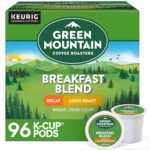
Green Mountain Coffee Roasters offers one of the best decaffeinated coffee pods, a light roast decaf option with their Breakfast Blend K-Cups. These pods produce a bright, crisp cup of coffee with subtle notes of citrus and nuts.
The light roast allows the coffee’s natural flavors to shine through, creating a refreshing and nuanced drinking experience.
One standout feature of Green Mountain’s decaf pods is their commitment to sustainability. The K-Cups are made with recyclable materials, and the company sources it’s coffee beans through fair trade practices.
This combination of quality and environmental consciousness makes these pods an attractive choice for eco-minded coffee drinkers.
Peet’s Coffee Decaf House Blend K-Cups
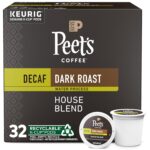
Peet’s Coffee brings it’s signature bold flavor to the decaf world with it’s House Blend K-Cups. This medium roast coffee offers a full-bodied taste with hints of spice and chocolate.
The robust flavor profile makes it an excellent choice for those who prefer a stronger cup of decaf coffee.
Peet’s uses a water process decaffeination method, which helps maintain the coffee’s original taste and aroma. The result is a decaf option that closely mimics the flavor of regular coffee, making it a popular choice among those transitioning to decaf or looking for an after-dinner brew.
Lifeboost Organic Decaf Medium Roast K-Cups
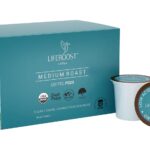
Lifeboost Coffee sets itself apart with it’s focus on organic, single-origin beans, which makes them one of the best decaffeinated coffee pods. Their Decaf Medium Roast K-Cups offer a smooth, low-acid coffee experience that’s gentle on the stomach.
The beans are sourced from high-altitude farms in Nicaragua and undergo a Swiss Water Process decaffeination.
What makes Lifeboost unique is it’s commitment to purity. The coffee is tested for mycotoxins, heavy metals, and pesticides, ensuring a clean and healthy cup every time.
While these pods come at a higher price point, the quality and peace of mind they offer make them worth considering for health-conscious coffee drinkers.
Maud’s Dreamy Creamy Salted Caramel Decaf K-Cups
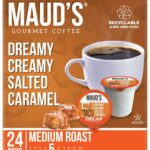
For those who enjoy flavored coffee, Maud’s Decaf Dreamy Creamy Salted Caramel K-Cups provide a delightful option. This medium roast coffee combines the smooth taste of decaf with the sweetly salty flavor of a salted caramel treat.
The result is a comforting cup that’s perfect for a relaxing evening or as a dessert accompaniment.
Maud’s uses 100% Arabica beans and a chemical-free decaffeination process to create their flavored decaf pods. The company also emphasizes freshness, roasting their beans in small batches to ensure optimal flavor.
These K-Cups offer a tasty choice for those who want to explore beyond traditional decaf options.
Koffee Kult Decaf Dark and Medium Roast K-Cups
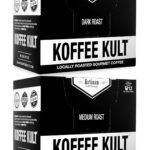
Koffee Kult caters to medium and dark roast enthusiasts with their Decaf Artisan Roasted K-Cups. The dark pods produce a bold, intense cup of coffee with notes of cinnamon and cocoa.
The rich flavor profile makes it an excellent choice for those who crave a robust decaf experience.
The brand uses Colombian Supremo beans, which are known for their smooth, well-balanced taste. Koffee Kult’s decaffeination process preserves the coffee’s natural oils, resulting in a full-bodied cup with a satisfying mouth feel.
These K-Cups are ideal for coffee lovers who want a strong decaf option that doesn’t compromise on flavor.
Dunkin’ Decaf Original Blend K-Cups
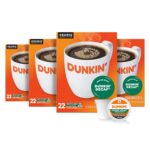
Dunkin’ brings it’s popular coffee shop flavor to the home with it’s Decaf Original Blend K-Cups. These medium roast pods offer a smooth, balanced taste that’s familiar to Dunkin’ fans.
The coffee has a mild acidity and a clean finish, making it an easy-drinking option for any time of day.
One advantage of Dunkin’ K-Cups is their wide availability and consistent quality. The brand uses a blend of Arabica beans to create a reliable decaf experience that closely mimics their in-store offerings.
For those who enjoy Dunkin’ coffee but want to cut back on caffeine, these pods provide a satisfying choice.
Starbucks Decaf Pike Place Roast K-Cups
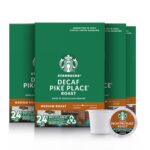
Starbucks’ Decaf Pike Place Roast K-Cups bring the coffeehouse experience home with a medium roast that’s smooth and balanced. Named after Seattle’s famous Pike Place Market, this blend offers subtle notes of cocoa and toasted nuts, creating a well-rounded flavor profile.
Starbucks uses a proprietary decaffeination process that aims to preserve the coffee’s original taste. The result is a decaf option that closely resembles their regular Pike Place Roast, making it a popular choice for Starbucks loyalists looking to reduce their caffeine intake.
These K-Cups are also compatible with a wide range of Keurig brewers, ensuring broad accessibility.
Tim Hortons Decaffeinated Medium Roast K-Cups
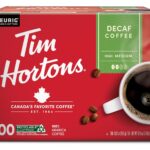
Tim Hortons, the beloved Canadian coffee chain, offers it’s Decaffeinated Medium Roast in convenient K-Cup form. These pods produce a smooth, mellow cup of coffee with a subtle sweetness and low acidity, making their brand one of the best decaffeinated coffee pods.
The balanced flavor profile makes it an excellent choice for all-day drinking.
Tim Hortons uses a blend of 100% Arabica beans from various regions to create their signature taste. The decaffeination process preserves the coffee’s original flavors, resulting in a cup that’s remarkably similar to their regular medium roast.
For fans of Tim Hortons or those seeking a reliable, middle-of-the-road decaf option, these K-Cups are worth trying.
| Brand | Roast Level | Flavor Profile | Decaf Method |
|---|---|---|---|
| Eight O’Clock | Medium | Smooth, balanced | Swiss Water Process |
| Green Mountain | Light | Bright, citrusy | Not specified |
| Peet’s | Medium | Bold, spicy | Water process |
| Lifeboost | Medium | Smooth, low-acid | Swiss Water Process |
| Maud’s | Medium | Salty, caramel | Chemical-free |
| Koffee Kult | Dark | Bold, intense | Not specified |
| Dunkin’ | Medium | Smooth, balanced | Not specified |
| Starbucks | Medium | Cocoa, toasted nuts | Proprietary process |
| Tim Hortons | Medium | Smooth, mellow | Not specified |
Each of these decaf K-Cup options offers a unique flavor profile and brewing experience. Whether you prefer a light, bright coffee or a bold, intense brew, there’s a decaf pod to suit your taste.
By exploring these different brands and roasts, you can find the perfect decaffeinated coffee to enjoy any time of day without compromising on flavor or quality.
The Rise of Decaf: Why More Coffee Lovers Are Making the Switch
Coffee has long been a beloved beverage, cherished for it’s rich flavor and energizing effects. However, in recent years, there has been a noticeable shift towards decaffeinated options.
This trend reflects changing consumer preferences and a growing awareness of the potential impacts of caffeine on health and well-being.
Let’s explore the reasons behind the increasing popularity of decaf coffee and why more coffee enthusiasts are making the switch.
Health Consciousness and Caffeine Sensitivity
One of the primary drivers behind the decaf trend is the growing focus on health and wellness. Many people are becoming more aware of how caffeine affects their bodies and are seeking choices that allow them to enjoy the taste of coffee without the stimulant effects.
For some, this means completely switching to decaf, while others opt for a mix of regular and decaffeinated coffee throughout the day.
Caffeine sensitivity is another factor contributing to the rise of decaf. Some people experience adverse reactions to caffeine, such as:
- Anxiety and jitters
- Disrupted sleep patterns
- Increased heart rate
- Digestive issues
- Headaches
By choosing decaf, these coffee lovers can continue to enjoy their favorite decaffeinated coffee beverage without the unwanted side effects.
Improved Decaffeination Processes
Advancements in decaffeination technology have significantly improved the taste and quality of decaf coffee. Modern methods, such as the Swiss Water Process and CO2 decaffeination, remove caffeine while preserving the coffee’s natural flavors and aromas.
This has led to decaf options that closely mimic the taste of regular coffee, making the switch more appealing to discerning coffee drinkers. It is fortunate that we have so many decaffeinated coffee pod options to try at home.
Evening Enjoyment and Better Sleep
Many coffee enthusiasts are turning to decaf as a way to enjoy their favorite beverage later in the day without disrupting their sleep patterns. Caffeine can remain in the body for several hours after consumption, potentially interfering with the ability to fall asleep or achieve restful sleep.
Decaf allows coffee lovers to savor a cup in the evening or after dinner without worrying about staying awake late into the night.
Pregnancy and Breastfeeding Considerations
Expectant and new mothers often switch to decaf coffee during pregnancy and while breastfeeding. While moderate caffeine consumption is generally considered safe during these periods, many women choose to limit or eliminate caffeine intake as a precautionary measure.
Decaf provides a way for these women to continue enjoying the ritual and flavor of coffee without concerns about caffeine’s potential effects on their baby.
Reduced Dependency and Improved Energy Management
Some coffee drinkers are opting for decaf as part of a broader effort to reduce their reliance on caffeine for energy. By switching to decaf, they can break the cycle of caffeine dependency and find more natural ways to maintain energy levels throughout the day.
This approach often involves improving sleep habits, increasing physical activity, and adopting a balanced diet.
Versatility in Coffee Consumption
The availability of high-quality decaf options has increased the versatility of coffee consumption. Coffee lovers can now enjoy their favorite beverage at any time of day without worrying about caffeine intake.
This flexibility allows for more spontaneous coffee moments and social gatherings centered around coffee, regardless of the time or person caffeine preferences.
Environmental and Ethical Considerations
As consumers become more environmentally conscious, some are drawn to decaf options that use eco-friendly decaffeination processes. Methods like the Swiss Water Process, which uses only water to remove caffeine, appeal to those seeking more natural and sustainable coffee options.
Additionally, many decaf brands emphasize fair trade practices and organic cultivation, aligning with the values of ethically-minded consumers.
| Decaffeination Method | Process | Environmental Impact | Flavor Retention |
|---|---|---|---|
| Swiss Water Process | Uses water and carbon filters | Low impact, chemical-free | High |
| CO2 Process | Uses pressurized carbon dioxide | Moderate impact, no chemical residue | High |
| Methylene Chloride Process | Uses chemical solvents | Higher impact, potential chemical residue | Moderate |
| Ethyl Acetate Process | Uses naturally derived solvents | Moderate impact, natural solvent | Moderate to High |
Culinary Applications
The improved quality of decaf coffee has also expanded it’s use in culinary applications. Chefs and home cooks are increasingly using decaf in recipes for desserts, marinades, and other dishes where they want the flavor of coffee without the caffeine content.
This trend has opened up new possibilities for incorporating coffee into various meals and treats throughout the day.
Flavor Variety
The range of flavors available in decaf K-Cups is impressive, catering to diverse preferences. From light breakfast blends to bold dark roasts and even flavored options like vanilla or hazelnut, there’s something for everyone.
Users appreciate the ability to experiment with different brands and roasts to find their perfect decaf cup.
People Also Asked
Are decaf K-Cups completely caffeine-free?
While decaf K-Cups contain significantly less caffeine than regular coffee, they are not entirely caffeine-free. Most decaf coffees still contain about 2-5 mg of caffeine per cup, compared to 95-200 mg in regular coffee.
How do decaf K-Cups compare to regular K-Cups in terms of taste?
Modern decaf K-Cups often taste very similar to regular K-Cups, especially in medium and dark roasts. Many users find it difficult to distinguish between the two in blind taste tests.
Are decaf K-Cups more expensive than regular K-Cups?
Decaf K-Cups are generally priced similarly to regular K-Cups, though some specialty or organic decaf options may be slightly more expensive.
Can decaf K-Cups be used in all Keurig machines?
Most decaf K-Cups are compatible with all Keurig machines, including both older and newer models. However, it’s always best to check the packaging for compatibility information.
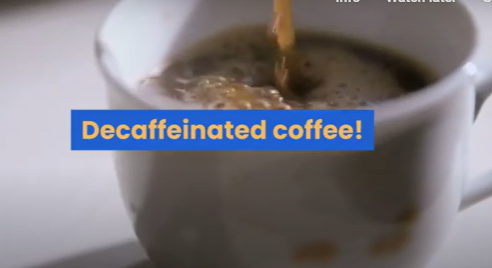
Versatility in Use
Decaf K-Cups aren’t just for those looking to cut out caffeine entirely. Many users incorporate them into their daily routines in creative ways.
Some opt for regular coffee in the morning and switch to decaf in the afternoon or evening to avoid sleep disruption.
Others mix decaf and regular K-Cups to create their own custom blend with reduced caffeine content.
The availability of decaf K-Cups has also made it easier for offices and shared spaces to cater to diverse preferences.